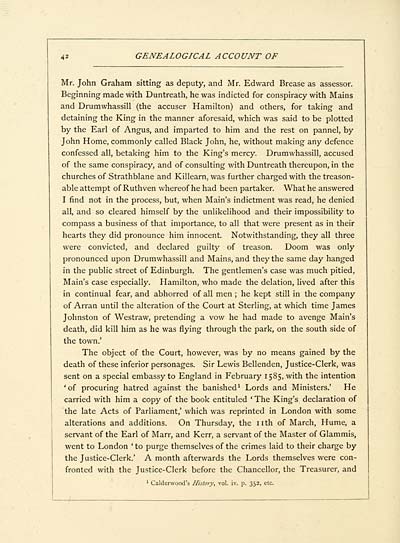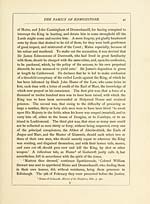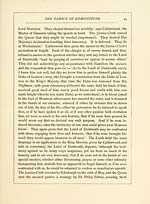Download files
Complete book:
Individual page:
Thumbnail gallery: Grid view | List view

GENEALOGICAL ACCOUNT OF
Mr. John Graham sitting as deputy, and Mr. Edward Brease as assessor.
Beginning made with Duntreath, he was indicted for conspiracy with Mains
and Drumwhassill (the accuser Hamilton) and others, for taking and
detaining the King in the manner aforesaid, which was said to be plotted
by the Earl of Angus, and imparted to him and the rest on pannel, by
John Home, commonly called Black John, he, without making any defence
confessed all, betaking him to the King's mercy. Drumwhassill, accused
of the same conspiracy, and of consulting with Duntreath thereupon, in the
churches of Strathblane and Killearn, was further charged with the treason-
able attempt of Ruthven whereof he had been partaker. What he answered
I find not in the process, but, when Main's indictment was read, he denied
all, and so cleared himself by the unlikelihood and their impossibility to
compass a business of that importance, to all that were present as in their
hearts they did pronounce him innocent. Notwithstanding, they all three
were convicted, and declared guilty of treason. Doom was only
pronounced upon Drumwhassill and Mains, and they the same day hanged
in the public street of Edinburgh. The gentlemen's case was much pitied,
Main's case especially. Hamilton, who made the delation, lived after this
in continual fear, and abhorred of all men ; he kept still in the company
of Arran until the alteration of the Court at Sterling, at which time James
Johnston of Westraw, pretending a vow he had made to avenge Main's
death, did kill him as he was flying through the park, on the south side of
the town.'
The object of the Court, however, was by no means gained by the
death of these inferior personages. Sir Lewis Bellenden, Justice-Clerk, was
sent on a special embassy to England in February 1585, with the intention
'of procuring hatred against the banished 1 Lords and Ministers.' He
carried with him a copy of the book entituled 'The King's declaration of
the late Acts of Parliament,' which was reprinted in London with some
alterations and additions. On Thursday, the nth of March, Hume, a
servant of the Earl of Marr, and Kerr, a servant of the Master of Glammis,
went to London ' to purge themselves of the crimes laid to their charge by
the Justice-Clerk.' A month afterwards the Lords themselves were con-
fronted with the Justice-Clerk before the Chancellor, the Treasurer, and
1 Calderwood's History, vol. iv. p. 352, etc.
Mr. John Graham sitting as deputy, and Mr. Edward Brease as assessor.
Beginning made with Duntreath, he was indicted for conspiracy with Mains
and Drumwhassill (the accuser Hamilton) and others, for taking and
detaining the King in the manner aforesaid, which was said to be plotted
by the Earl of Angus, and imparted to him and the rest on pannel, by
John Home, commonly called Black John, he, without making any defence
confessed all, betaking him to the King's mercy. Drumwhassill, accused
of the same conspiracy, and of consulting with Duntreath thereupon, in the
churches of Strathblane and Killearn, was further charged with the treason-
able attempt of Ruthven whereof he had been partaker. What he answered
I find not in the process, but, when Main's indictment was read, he denied
all, and so cleared himself by the unlikelihood and their impossibility to
compass a business of that importance, to all that were present as in their
hearts they did pronounce him innocent. Notwithstanding, they all three
were convicted, and declared guilty of treason. Doom was only
pronounced upon Drumwhassill and Mains, and they the same day hanged
in the public street of Edinburgh. The gentlemen's case was much pitied,
Main's case especially. Hamilton, who made the delation, lived after this
in continual fear, and abhorred of all men ; he kept still in the company
of Arran until the alteration of the Court at Sterling, at which time James
Johnston of Westraw, pretending a vow he had made to avenge Main's
death, did kill him as he was flying through the park, on the south side of
the town.'
The object of the Court, however, was by no means gained by the
death of these inferior personages. Sir Lewis Bellenden, Justice-Clerk, was
sent on a special embassy to England in February 1585, with the intention
'of procuring hatred against the banished 1 Lords and Ministers.' He
carried with him a copy of the book entituled 'The King's declaration of
the late Acts of Parliament,' which was reprinted in London with some
alterations and additions. On Thursday, the nth of March, Hume, a
servant of the Earl of Marr, and Kerr, a servant of the Master of Glammis,
went to London ' to purge themselves of the crimes laid to their charge by
the Justice-Clerk.' A month afterwards the Lords themselves were con-
fronted with the Justice-Clerk before the Chancellor, the Treasurer, and
1 Calderwood's History, vol. iv. p. 352, etc.
Set display mode to:
![]() Universal Viewer |
Universal Viewer | ![]() Mirador |
Large image | Transcription
Mirador |
Large image | Transcription
Images and transcriptions on this page, including medium image downloads, may be used under the Creative Commons Attribution 4.0 International Licence unless otherwise stated. ![]()
| Histories of Scottish families > Genealogical account of the family of Edmonstone of Duntreath > (60) |
|---|
| Permanent URL | https://digital.nls.uk/95354175 |
|---|
| Description | A selection of almost 400 printed items relating to the history of Scottish families, mostly dating from the 19th and early 20th centuries. Includes memoirs, genealogies and clan histories, with a few produced by emigrant families. The earliest family history goes back to AD 916. |
|---|

